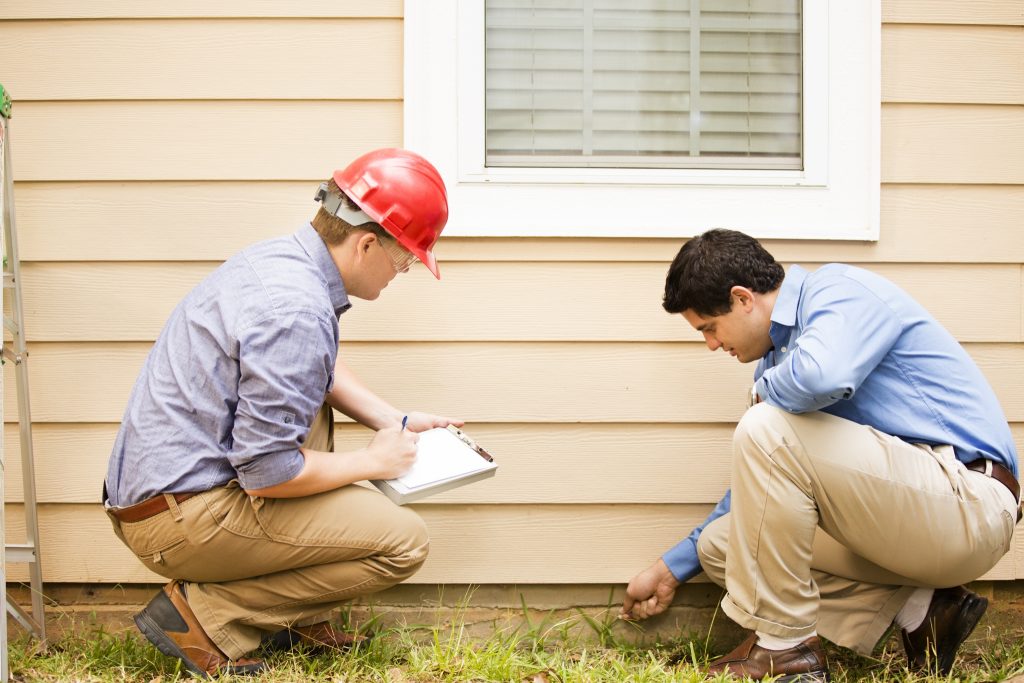Inspection vs. Appraisal for Home Buyers: What's the Difference?

Written by Val Jordan on April 3, 2020
Inspections and appraisals are both important parts of the home buying process, and buyers should do both to protect their financial interest in a home — and give themselves peace of mind that they’re making a smart purchase. Inspections and appraisals serve different functions, but both give you the insights you need to avoid large financial missteps.
What is the difference between an appraisal and an inspection?
The main difference between an appraisal and an inspection is that an appraisal deals with the value of a home, while an inspection deals with the condition of the home.
What is an appraisal?
A home appraisal is a walk-through and a general assessment of a house, analyzed with the help of nearby comparable sales. The goal of an appraisal is to determine the fair market value of a property. It is conducted by a licensed professional appraiser. While an appraiser will visit a home in person, the majority of the work will be done in their office, as they compare the home’s features, location, and finishes with other comparable recent sales in the area. An appraisal usually costs around $400, depending on where you live and the size of your home.
What is an inspection?
An inspection is a deeper dive into the condition of the specific home. A licensed home inspector will spend multiple hours doing a comprehensive review of the home’s condition, both visually and by testing functionality of major systems. After completing the inspection, they will provide recommendations to the buyer on items in the home that should be repaired or replaced before closing. A home inspection costs between $250 and $700, depending on where you live and the size of your home.
Do lenders require appraisals?
Yes, most lenders do require appraisals in order to approve financing. Lenders want to protect their investment by ensuring they're not financing a loan for more than the property is worth.
Do lenders require home inspections?
Lenders providing conventional financing do not usually require home inspections, but they are still strongly recommended. FHA or VA loans usually do require inspections.
Do I need an appraisal and inspection when buying a home with cash?
Cash buyers often opt to do an appraisal and inspection, even though they're not required. Some cash buyers, particularly home investors, may waive the inspection or appraisal if the home is being sold 'as is' or if they are competing with other offers and want to close quickly.
Regardless of how you're paying, an appraisal can give peace of mind that you're not overpaying for a property, and an inspection can uncover potentially costly issues and necessary repairs.
What happens during an appraisal?
During an appraisal, a licensed appraiser evaluates the home you want to buy in person and gives you an estimate on how much it's worth. Typically, the appraiser is chosen by the lender but paid for by the buyer as part of the closing costs.
Appraisals cost around $400, but can cost a bit more or a bit less depending on your home size and location. The appointment usually takes about an hour, and then the appraiser will complete the report back at their office.
1. Assessment of property
The appraiser will walk through the home, taking note of its condition, finishes and location — consider it somewhat like a light inspection.
2. Review of comparable sales
The appraiser will use the findings of their walk-through to identify similar homes that have sold recently in the neighborhood. This will help them decide upon a fair market value.
3. Final report
The appraiser will deliver a physical report on the fair market value of the home, including photos and descriptions of comparable sales. In most cases it's just the lender and the buyer who will receive copies of the report. The seller may request a copy of the appraisal report, but in most cases you are not required to share it.
Ideally, the appraisal will come back higher than the agreed-upon sales price. That indicates that you're paying less than the fair market value and your lender will approve the loan.
What if the appraisal comes in low?
Appraisals that come in below the agreed-upon sale price are commonly referred to as low appraisals. When an appraisal comes in low it can jeopardize your ability to acquire the loan you were pre-approved to get, causing a headache for buyers.
Low appraisals can happen for a couple reasons:
- Bidding wars with multiple buyers drive the price up beyond market value.
- There's a lack of relevant comparables to use as a basis for the home value.
- You're buying in a high season (like late spring) and the only available comparables are from other points in the year.
- The appraiser is inexperienced.
Buyers who are using financing have a few options to work around a low appraisal:
- Contest the appraisal: You can contact your lender and point out any glaring issues or errors in the appraisal report, then request a new appraisal.
- Pay the difference: To make up the difference between the amount your lender is willing to finance and the offer price, you can pay cash or ask the lender if you can restructure your financing.
- Ask the seller for a price reduction: If the appraisal was accurate and the home is indeed worth less than what you're offering, you may not want to overpay. To avoid having to back out completely, consider asking the seller for a price reduction, using the appraisal report as proof the home is overpriced.
What to expect from a home inspection
Scheduling a home inspection is one of the first tasks you'll want to do after the contract is signed between you and the seller. Although, in some low-inventory markets, buyers sometimes hire an inspector prior to making an offer. It's up to you to pick a home inspector you trust, and most people ask their agent for a recommendation, get a referral from friends or family members or search online reviews.
Since the goal of a home inspection is to get a comprehensive report of the condition of the home you're buying, a home inspection takes between three and four hours, sometimes more. Unlike an appraiser who does a visual check of the home, your inspector will both examine and test functionality of your home's key systems, including:
- Plumbing
- Roof condition
- HVAC
- Foundation
- Appliances
- Drainage
- Water damage and mold
However, a home inspection may not find every potential issue in the home, especially if they are hidden or seasonal, so buyers should discuss any exclusions with the licensed home inspector both before and after the inspection itself.
Who attends the inspection: Usually, the buyer and their agent will both attend the inspection. This allows you to have the inspector walk you through any red flags in real time, while also giving you the chance to familiarize yourself with how the home's systems work ahead of moving.
What happens after the inspection: After completing the on-site inspection, your inspector will provide a written report that highlights their findings, including photos.
Specialized inspections for buyers to consider
While inspecting the home's major systems and features is standard practice, your inspector may recommend a second, more specialized inspection if they notice issues including:
- Radon
- Pests
- Septic
- Lead paint
Why home inspections are important
The few hundred dollars you'll spend for a home inspection is a small price to pay for the opportunity to confirm that the home you're about to buy is free of major — and costly — issues. It’s no wonder 83% of buyers reported having an inspection done, according to the Zillow Group Consumer Housing Trends Report 2019.
Risk of not having an inspection: While some buyers opt to waive their inspection contingency to make their offer appear stronger, this means they’re essentially buying the home “as-is,” and any issues discovered after closing will fall 100% to the buyer to repair, even if they were present before closing.
Why disclosures aren't enough: In most states, sellers are required to disclose underlying issues in the home that they know exist (specific disclosure requirements vary by state). While disclosures are an important protection, they only cover un-repaired issues that the seller knows about — there’s no guarantee that the home is free of other underlying issues or that the repairs were made correctly. A home inspection is simply the best way to find out about any potential problems in the home.
How are home inspections and appraisals similar?
Despite having two different processes and requiring the services of two different professionals, appraisals and inspections do share some similarities:
1. Appraisers and inspectors are licensed
Both roles require licenses and extensive training. Both appraisers and inspectors act as impartial third parties, paid to provide their professional opinion.
2. Buyers pay for both inspections and appraisals
Usually, the buyer selects the home inspector they want to work with and the lender selects the appraiser. The buyer pays for both the inspector and the appraiser, unless otherwise negotiated.
3. Appraisal and inspection both occur during escrow
The home inspection usually happens within the first week after your offer is accepted — the sooner the better, so there's time to fix any issues flagged in the inspection report or renegotiate with the seller. The appraisal also happens during the escrow period, usually a week or two before closing.
4. Appraisal and inspection results allow for negotiations
Assuming you've structured your offer to include contingencies for both the appraisal and inspection, you'll be allowed to renegotiate your offer based on the findings. If the appraisal comes back low, you're allowed to renegotiate with the seller to figure out how to cover the difference between the appraised price and the offer price. Similarly, if the inspection report uncovers significant repairs, you'll have a period of time where you can request repairs or credits, or back out of the deal without losing your earnest money.
How much home can you afford?
At Zillow Home Loans, we can pre-qualify you in as little as 5 minutes, with no impact to your credit score.
Zillow Home Loans, NMLS # 10287. Equal Housing Lender
Get pre-qualifiedHow much home can you afford?
See what's in reach with low down payment options, no hidden fees and step-by-step guidance from us at
Zillow Home Loans.
Zillow Home Loans, NMLS # 10287. Equal Housing Lender
Calculate your BuyAbility℠
Related Articles
Get a mortgage with Zillow Home Loans
Go from dreaming to owning with low down payment options, competitive rates and no hidden fees. A dedicated loan officer will guide you until you have your keys in hand.

Zillow Home Loans, NMLS #10287. Equal Housing Lender.



